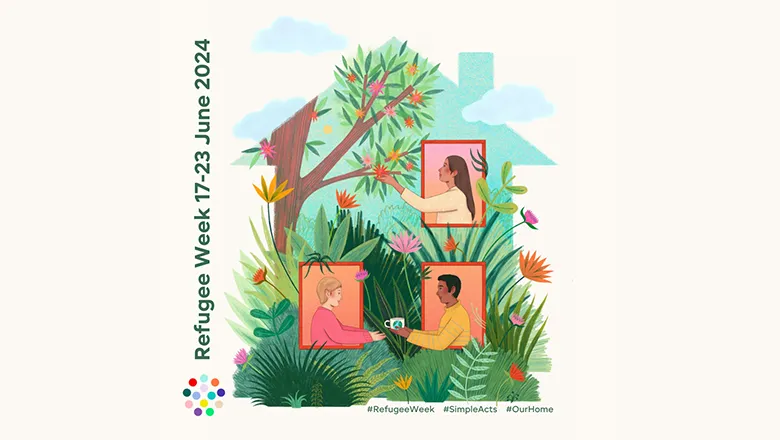I was playing with my first born, who was then a baby, at the beach in Spain in 2017 and it suddenly occurred to my wife and I that we were having fun in the same sea that swallowed thousands of fellow Syrians, and thousands more from across Asia and Africa who were simply trying to find safety for themselves and their family members.
Dr Aqeel Abdulla, Lecturer in the Faculty of Arts & Humanities and Deputy Director of the King's Sanctuary Programme.
18 June 2024
Refugee Week 2024: Shining a light on the lives and experiences of displaced people
King’s academics, students, staff and alumni are sharing their stories and hosting events to mark Refugee Week, a UK-wide festival celebrating the contributions, creativity and resilience of refugees and people seeking sanctuary.

To mark Refugee Week 2024, members of our King’s community are speaking about their personal experiences and ways in which they are helping refugees work and study in the UK.
'I owe it to my baby - to raise him away from war and insecurity'
Dr Aqeel Abdulla, a Lecturer in Culture, Media and Creative Industries in the Faculty of Arts & Humanities, reveals what it means to be unable to return to his home in Syria, 15 years after leaving, and how he took on the role of Deputy Director of King’s Sanctuary Programme because he always feels a sense of duty towards fellow refugees and asylum seekers.
King's colleagues on their lives before and since being displaced:
Dr Olha Myshakivska, a Research Fellow in the Institute of Psychiatry, Psychology & Neuroscience, and Iryna Peretiazhko, a Research Assistant in the Faculty of Life Sciences & Medicine, share what home means to them, insights into their experiences in the UK and what their lives were like in Ukraine before they were displaced by the war.
It was a carefree and happy existence, filled with endless possibilities.
Iryna Peretiazhko, Research Assistant, Faculty of Life Sciences & Medicine
The King's student helping refugees secure stable employment
Third year Political Economy student Deepi Sahota highlights her experience of helping refugees find employment through her work for the Breaking Barriers organisation. She outlines how supporting refugees to find work represents a crucial step in helping them to rebuild their lives, foster community connections and feel at home in the UK.
Finding employment isn't just about securing a job; it's about finding a sense of home. It represents a crucial step in the journey toward rebuilding lives, fostering community connections, and ultimately feeling truly at home in the UK.
Deepi Sahota, Third year Political Economy student
Five years later: the Dr Monica Malik Refugee Bursary
King's alumni Dr Monica Malik (Geography, 1992) reflects on how a refugee bursary that she set up five years ago has empowered postgraduate refugees to attend King’s. In an InTouch magazine article, she shared stories from some of the extraordinary students she has supported and explained the part education has played in her own journey.
I wanted to give people who had lost so much a chance to rebuild their lives and to let them know that someone cares.
Dr Monica Malik
Most Ukrainians displaced by the war plan to return home as soon as it is safe to do so.
New research led by Dr Cevat Giray Aksoy, of the Department of Political Economy, was released that showed 58 percent of Ukrainian refugees still plan to return home when it is safe and seven percent want to go back to Ukraine soon. Only eight percent planned to settle outside of Ukraine. He said prior to Russia's invasion the population had been declining and there were some challenges around corruption and the judiciary that might deter people from wanting to return.
A critical challenge for Ukraine will be to leverage the common purpose fostered by the war to drive broader institutional and cultural changes. By addressing these challenges, Ukraine can enhance the appeal of returning for refugees and effectively utilise their human capital in the post-war rebuilding process.
Dr Cevat Giray Aksoy and co-authors
How employers can help support refugees in the workplace
More than 26 million refugees & asylum seekers worldwide face huge barriers to securing decent work. New research co-authored by Dr Mladen Adamovic of King’s Business School shares how employers can support them to find jobs and be successful in the workplace.
By addressing the challenges faced by refugees, organisations can develop an inclusive environment that not only supports refugee employees but also improves organisational performance.
Dr Mladen Adamovic of King’s Business School
Events at King's during Refugee Week
Monday 17 June: The Fifth Workshop on the Economics and Politics of Migration hosted by King’s with the European Bank for Reconstruction and Development and organised by Cevat Giray Aksoy, Seyhun Orcan Sakallı, Pierre-Louis Vézina.
Tuesday 18 June and Wednesday 19 June: A workshop on ‘Visual Justice: Empowering modern slavery victims through legal design’ hosted by The Centre for International Governance and Dispute Resolution in The Dickson Poon School of Law. It features speakers Professor Philippa Webb, of King’s and Twenty Essex, Ishaani Shrivastava, of Devereux Chambers, and Avril Sharp, Kalayaan
Thursday 20 June: A Celebration of World Refugee Day featuring a talk by Dr Abdulla on the topic of representation, misrepresentation and self-representation of refugees and asylum seekers in the arts, plus an African drumming workshop led by Allan Kerr from Shumba Arts, a Devon-based participatory African art group.
Related departments
- Faculty of Social Science & Public Policy
- Faculty of Arts & Humanities
- Faculty of Life Sciences & Medicine
- Faculty of Natural, Mathematical & Engineering Sciences
- Faculty of Dentistry, Oral & Craniofacial Sciences
- Florence Nightingale Faculty of Nursing, Midwifery & Palliative Care
- Institute of Psychiatry, Psychology & Neuroscience
- The Dickson Poon School of Law
- King’s Business School
- Service at King’s
